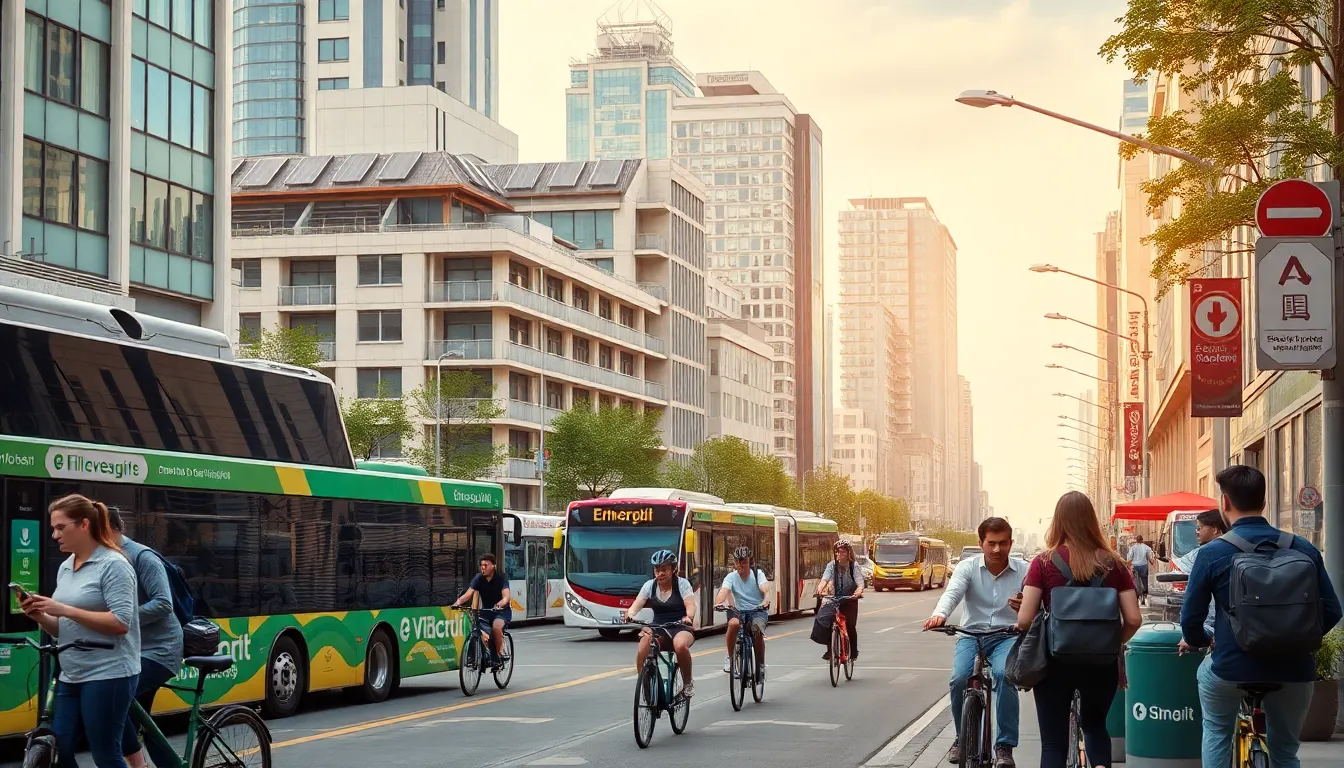In an era where cities are rapidly expanding, urban tech solutions are transforming the way we live, work, and interact. These innovative technologies address pressing urban challenges like traffic congestion, pollution, and inadequate public services. By leveraging data and connectivity, they create smarter, more efficient cities that enhance the quality of life for residents.
From smart transportation systems to energy-efficient buildings, urban tech solutions are redefining urban landscapes. They empower city planners and residents alike, fostering sustainability and resilience in the face of growth. As technology continues to evolve, the potential for urban innovation is limitless, paving the way for a brighter, more connected future.
Table of Contents
ToggleOverview of Urban Tech Solutions
Urban tech solutions encompass a range of innovations designed to improve city living. These technologies enhance infrastructure, streamline services, and promote sustainable development across urban landscapes. Key areas of focus include smart transportation systems, energy-efficient buildings, and integrated data management.
Smart Transportation Systems
Smart transportation systems utilize real-time data and connectivity to optimize traffic flow, reduce congestion, and enhance public transit. Features include:
- Traffic management: Adaptive traffic signals that adjust based on real-time conditions.
- Public transit: Apps providing live updates and scheduling for buses and trains.
- Car-sharing services: Platforms that facilitate access to vehicles on demand.
Energy-Efficient Buildings
Energy-efficient buildings focus on reducing consumption while enhancing comfort. Technology features in this area include:
- Smart grids: Systems that optimize electricity distribution and consumption.
- Renewable energy sources: Integration of solar panels and wind turbines into building designs.
- Energy management systems: Tools that monitor usage patterns and provide efficiencies.
Data-Driven Urban Planning
Data-driven urban planning leverages data analytics for informed decision-making. Benefits include:
- Predictive modeling: Analyzing data to anticipate growth trends and infrastructure needs.
- Community engagement: Platforms for residents to provide feedback and participate in planning processes.
- Resource allocation: Using data to prioritize investments in public services and amenities.
Sustainable Urban Environments
Sustainability remains a central pillar of urban tech. Solutions contribute to environmental preservation through:
- Green spaces: Technology to manage and maintain urban parks and community gardens.
- Waste management: Smart bins that signal when they need collection, optimizing routes.
- Water management: Systems for monitoring water quality and improving distribution efficiency.
Urban tech solutions enhance urban living by addressing challenges and promoting innovation, laying the groundwork for resilient cities.
Key Urban Tech Solutions

Urban tech solutions play a crucial role in transforming city living by offering innovative approaches to everyday challenges. These solutions enhance efficiency, sustainability, and quality of life in urban areas.
Smart Transportation Systems
Smart transportation systems utilize real-time data to improve traffic management and public transit. These systems integrate advanced technologies such as GPS, AI, and IoT to monitor traffic patterns and optimize travel routes. For instance, adaptive traffic signals adjust their timings based on current traffic flow, reducing congestion. Additionally, mobile apps provide commuters with real-time updates on public transit schedules, helping to minimize wait times and enhance connectivity.
Energy Efficiency Technologies
Energy efficiency technologies focus on reducing energy consumption in buildings and infrastructure. Smart grids allow for real-time energy management, optimizing usage based on demand. Automated systems in buildings control lighting, heating, and cooling, which reduces energy waste. For example, energy-efficient LED lighting consumes up to 75% less energy than traditional bulbs, contributing to lower utility costs. Integrating renewable energy sources like solar panels further enhances sustainability in urban environments.
Waste Management Innovations
Waste management innovations leverage technology to improve recycling rates and reduce landfill reliance. Smart bins equipped with sensors monitor waste levels, notifying sanitation services when collection is needed. This optimizes collection routes and schedules, decreasing operational costs. Automated sorting technologies utilize AI to separate recyclables from waste, enhancing efficiency. Cities implementing these solutions report up to 30% increases in recycling rates, contributing to healthier urban ecosystems.
Public Safety Enhancements
Public safety enhancements utilize technology to create safer urban environments. Surveillance systems integrated with AI can analyze footage in real-time, promptly identifying suspicious activities. Emergency response systems equipped with data analytics improve response times to incidents, ensuring public safety. For instance, smart streetlights enhance visibility and detour traffic during emergencies. Communities adopting these advancements experience a noticeable decrease in crime rates, fostering a sense of security among residents.
Benefits of Implementing Urban Tech Solutions
Implementing urban tech solutions brings significant benefits to cities. These advantages range from economic growth to enhanced quality of life and environmental sustainability.
Economic Growth
Urban tech solutions stimulate economic activity by attracting investments and fostering innovation. Smart infrastructure improves efficiency, reducing operational costs for businesses. For example, smart transportation systems facilitate logistics, enabling quicker deliveries. Tech-driven urban environments create job opportunities, particularly in sectors like IT, engineering, and green technologies. Furthermore, increased efficiency in service delivery promotes business expansion, leading to enhanced productivity and competitiveness.
Improved Quality of Life
Urban tech solutions significantly improve residents’ quality of life. Smart transportation options reduce travel times, easing daily commutes. Data-driven approaches enhance public services, ensuring they meet the community’s needs effectively. For instance, real-time data might optimize public transit schedules, reducing wait times. Additionally, smart energy solutions create comfortable living environments by maintaining ideal temperatures and managing energy use efficiently. Enhanced public safety through AI-based surveillance systems contributes to a sense of security in urban areas.
Environmental Sustainability
Urban tech solutions foster environmental sustainability by promoting resource efficiency and reducing waste. Smart waste management systems, equipped with sensors and data analytics, optimize collection routes, decreasing emissions. Energy-efficient buildings leverage smart grids to reduce energy consumption, supporting renewable energy integration. Moreover, urban greenery solutions enhance biodiversity and air quality, contributing to healthier urban ecosystems. These initiatives not only combat climate change but also encourage community engagement in environmental stewardship.
Challenges and Considerations
Urban tech solutions face significant challenges that require careful consideration. Understanding these hurdles helps stakeholders make informed decisions for successful implementations.
Funding and Investment
Securing funding for urban tech projects often presents obstacles. Municipalities may struggle with budget constraints, limiting their ability to invest in innovative solutions. Public-private partnerships can provide alternative financing options, allowing for shared resources and expertise. Initiatives such as grants and state-level funding also aid in fostering innovation. Furthermore, attracting private investment can encourage industry stakeholders to support urban development projects focused on sustainability and efficiency.
Data Privacy and Security
Data privacy and security remain critical concerns in the deployment of urban tech solutions. As cities collect vast amounts of data, the risk of cyber threats and misuse increases. Implementing robust security measures is essential to protect sensitive information from breaches. Adopting best practices, such as data anonymization and encryption, helps mitigate risks. Clear policies outlining data usage and sharing are necessary to build trust among residents. Transparency in data collection processes ensures community confidence in urban tech initiatives.
Community Engagement
Community engagement plays a crucial role in the success of urban tech solutions. Involving residents from the planning stages fosters a sense of ownership and increases acceptance of new technologies. Effective outreach strategies, such as public forums and surveys, provide valuable feedback on community needs and preferences. Ensuring diverse representation in decision-making processes also promotes inclusivity. Educating residents about the benefits of urban tech enhances participation and encourages collaboration toward common goals.
Urban tech solutions are paving the way for smarter and more sustainable cities. By leveraging data and innovative technologies, these solutions tackle pressing urban challenges while enhancing the quality of life for residents. As cities continue to grow, the integration of smart transportation, energy-efficient buildings, and data-driven planning will play a crucial role in shaping urban environments.
Despite the challenges of funding and data privacy, the potential benefits far outweigh the obstacles. With community engagement and public-private partnerships, cities can successfully implement these transformative technologies. The future of urban living is bright, as urban tech not only addresses immediate issues but also fosters long-term sustainability and resilience. Embracing these innovations will lead to thriving urban spaces that prioritize both people and the planet.



